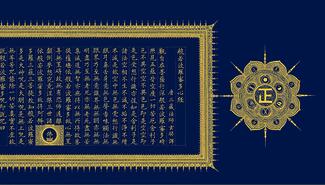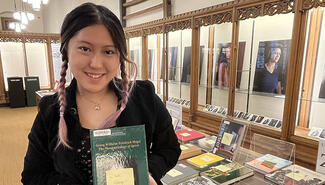Dawn Smith and Courtney Hadley, co-chairs of the Advisory Committee on Library Staff Diversity and Inclusion
May 3, 2024
Dawn Smith
Dawn Smith is the associate director for Technical Services for the Lillian Goldman Law Library. She came to Yale Library after 10 years at the Loyola Los Angeles Law School—now Loyola Marymount Law School—where she most recently held the position of head of technical services.
Dawn oversees the library’s acquisitions of materials in all formats and makes them accessible to members of the university community. She also manages the budget for the law library’s collection.
Recently, Dawn has been serving as the project lead in the law library’s migration from its integrated library system, Innovative Interfaces Sierra, which was adopted in 1988, to the Ex Libris library service platform Alma. Yale Library is also migrating to Alma from its platform, Voyager. The two library systems have historically been separate in many of their operations, but “we’re coming together in this work,” Dawn said.
“It’s a huge project for everyone involved, and it is something I specifically wanted to take on when I became head of this department. I am really proud of the work that has already gone forward and the relationships that we are building with the university library.”
Dawn supervises a staff of nine, ensuring that her department’s work aligns with the mission and vision of the law school and Yale University. She is committed to making sure her team is well resourced and supported in their career goals and ambitions. Her own goal, she said, is to make sure that the law library is a “good place to work.”
Since her arrival at Yale, Dawn has served on many library and university committees. She is especially proud of the work and sense of community in the antiracism group she co-chairs at the law library. She is also proud of the work accomplished during her several years on Yale Library’s Advisory Committee on Library Staff Diversity and Inclusion. She is now co-chair of that committee with Courtney Hadley. The primary work of the advisory committee is to make annual recommendations to the members of the Library Executive Committee (LEC) about ways to improve and support the work of library staff.
Dawn officially joined the advisory committee in January 2021 but worked closely with the group throughout 2020. It was a challenging time in the country—in the midst of the COVID-19 pandemic and in the aftermath of the murders of George Floyd, Breonna Taylor, and Ahmaud Arbery.
“There were inequities across the board in how staff members were experiencing the workplace, which was changing rapidly due to remote work options available to some but not others,” she said. “And not just at Yale. I think Yale did the best that it could at the time, but nationwide, worldwide, essential workers were literally putting their lives on the line to do the routine work that makes all of our lives easier—including helping students attend class and helping library patrons access the resources they needed.”
During that time, some staff members looked to the advisory committee’s members for help and advice. “Trying to offer staff support then took a lot of care and compassion from the committee. I learned a great deal about my colleagues and the things that concern them, and I learned how to help them navigate the many resources available to them at the university.”
The advisory committee’s work during that difficult period eventually inspired the group to recommend that library leadership develop the DEIA Staff Climate Survey, which circulated to staff in the fall. With information gathered from the survey, town hall discussions, and direct feedback, the advisory committee will make recommendations to the LEC. The committee hopes that staff members’ feedback about their needs will lead to positive changes and improvements in how they experience the workplace.
“This work is extremely important to who I am and what I believe a great place to work looks like,” Dawn explained. “Having people from every diverse background on staff and all of us experiencing equity, inclusion, and accessibility in our workplaces is the ultimate goal. As librarians and library staff, as a community, as professionals, we spend so much time caring for and providing services to patrons and the communities that we serve. But it is critically important that our needs are heard, cared for, and provided for, too.”
“I’ve gotten great support in the DEIA work at Yale,” she added. “To be around a group of people focused on this work has been a privilege and something I don’t take for granted, because you don’t find that at every institution. Not every organization supports these efforts the way Yale has supported them.”
“The work here is sustainable and scalable—because of that support from library and university leadership—and the advisory committee will continue to exist into the future because it’s about caring for the needs of the staff and giving them a voice in the library organization.”
The committee encourages volunteers to join in to help move the work forward. “We all still have hopes and dreams and we do hope things get better, but we are moving now into a time of action, to implement and operationalize these ideals that we’ve been speaking about for so long.”
Courtney Hadley
In her role as research and education librarian at the Cushing Whitney Medical Library, Courtney Hadley supports students in the Yale School of Medicine students throughout their four-to-five-year program. She manages the medical school’s personal librarian program and collaborates with other personal librarians to forge connections with the schools and departments they all serve.
Working with Megan Nance, head of Access and Delivery Services, Courtney recently helped put together a collection of graphic medicine titles. “A lot of people do know what graphic novels are,” she explained, “but don’t know that there’s a subgenre called graphic medicine.” These illustrated publications have a medical focus—for example, a patient’s experience undergoing cancer treatment, a physician’s experience in medical school, or a family member’s experiences caring for a parent with Alzheimer’s Disease.
“Graphic medicine presents different ways to approach health-related topics in a very human way,” Courtney said, “which I see as an important part of a student’s medical education. It’s one thing to look at textbooks and learn about medicine and how it applies to a patient, but it’s also important to remember that as a physician, you are dealing with people.”
Thanks to a generous grant, the medical library was able to acquire the collection, making them available to the entire Yale community. Just this year, Courtney said, more than half of the collection has already circulated among students. The grant also enabled the library to purchase an identical collection for a local magnet high school that has a medical track for students who wish to pursue careers in the healthcare professions.
“It was really great to offer this gift to an upcoming generation of students who will someday be going through our higher education systems and provide them with a different way of viewing the kind of professional track that they’re interested in,” Courtney said.
Courtney has been an active member of Yale Library’s Advisory Committee for Diversity and Inclusion since 2021 and currently serves as co-chair of the committee with Dawn Smith. In their roles, both Courtney and Dawn are actively involved with the recent DEIA Staff Climate Survey—assessing staff feedback and suggesting recommendations to put before library leadership for consideration. “I really applaud Risë Nelson and her team and the Climate Task Force and everyone who took the time and effort to create that survey. It comes at a great time, and I’m looking forward to the direction this work is going to take us.”
Despite the challenges of the process, Courtney is committed to the group’s work, which directly aligns with her personal values—and she is hopeful. “The work environment needs to be a place where we all see ourselves, a place where we can support each other and see each other as more than just the jobs that we hold. It takes time, but I can be patient. I see that coming.”



